
International Assessment of the Business Climate in Uzbekistan
In recent years, the global business community has witnessed impressive changes and qualitative transformations in Uzbekistan’s business landscape. Since 2017, the country has undergone significant reforms, opening new perspectives and opportunities for entrepreneurs. International organizations and analytical agencies acknowledge a secure and favorable environment for innovation and entrepreneurial activities. In this article, we will explore the latest analytical reports from international organizations and business opportunity rankings in Uzbekistan.
Risk and Opportunity Assessment by the Organization of Islamic Cooperation
The report compiled by the Organization of Islamic Cooperation (OIC) on the investment climate and opportunities includes an analysis of risks and uncertainties in member countries. Specifically, the analysis was conducted by assessing risk premiums on credit default swaps. Credit default swaps serve as insurance against negative consequences for borrowers, and the higher the likelihood of default, the more expensive the risk premium. This is an indirect indicator of the investment climate in the country, with many international organizations taking it into account when selecting a location for new investments.
The average risk premium in OIC countries stands at 5.1%. The risk premium on credit default swaps in Uzbekistan is 4.5%, below the OIC average. Consequently, Uzbekistan ranks among the 17 most resilient economies to the risk of default within the OIC member countries. 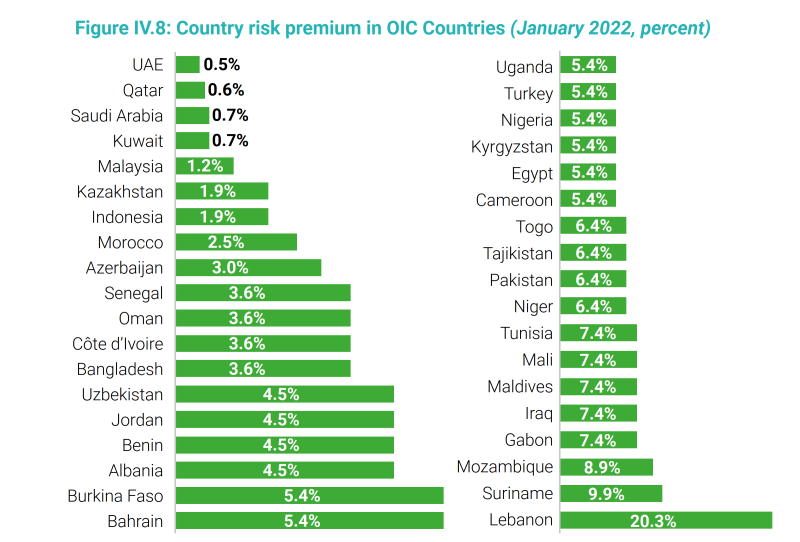
Figure 1. Risk premium in OIC countries
Minimal Barriers for Business Opening and Operation
The OIC report underscores the importance of enhancing online business registration processes to adapt to global economic changes. Digital information portals and “single windows” have the potential to streamline the registration of enterprises for foreign investors and organizations operating in the country.
As of 2021, according to the UNCTAD Global Entrepreneurship Network Index, Uzbekistan is recognized among the countries with the best “single windows”, achieving the highest score.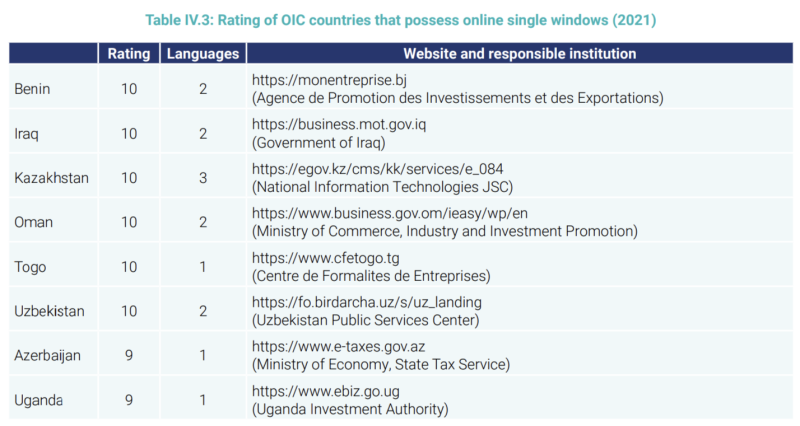
Figure 2: Rating of OIC countries on “Single Windows”
Priority Directions
The analysis of the OIC report reveals some regional variations in target and priority sectors for attracting foreign direct investments. According to the report, virtually all industries in Uzbekistan are favorable for investment, including the information and communication technology (ICT) sector.
Analysis of the Business Climate by the OECD
The Organization for Economic Cooperation and Development (OECD) has conducted a periodic analysis of the business climate in Uzbekistan. The report highlights that since the commencement of an extensive reform program in 2017, Uzbekistan has achieved significant success in shaping a competitive private sector.
The steps taken by the government in recent years contribute the enhancement of socio-economic stability and the opening of the economy to new investments, technologies, and ideas. The country’s resilience in the face of COVID-19 and political upheavals attests to the cautious and flexible policies of the authorities.
The OECD conducted a survey of private enterprises in Uzbekistan, the majority of which are wholly or partially owned by EU companies. Respondents noted achievements in three priority areas:
- Simplification of cross-border trade procedures.
- Significant efforts by the government to improve the regulatory environment for business operations.
- Opportunities provided by digitalization in Uzbekistan.
At the same time, survey participants anticipate further efforts from the government to enhance conditions in these areas.
A significant portion of respondents emphasized the importance of market opportunities — both domestic and regional, as a factor influencing their decisions to enter the Uzbekistan market. Overall, enterprises assessed the business climate in Uzbekistan as "favorable" and acknowledged evident progress in business operating capabilities.
Respondents also observed the ongoing digital transformation processes in Uzbekistan. The majority of enterprises have implemented advanced digital tools such as customer relationship management software and cloud technologies. Companies also positively evaluated government efforts to streamline the process of delivering public services.
The report provides recommendations aimed at boosting investments in communication infrastructure and digital technologies. In particular, the analysis notes the relatively high cost of fixed broadband, accounting for 2.1% of GNI. However, this figure is significantly lower than in some Central Asian countries and nearly approaches the Sustainable Development Goal target, which is 2% of GNI.
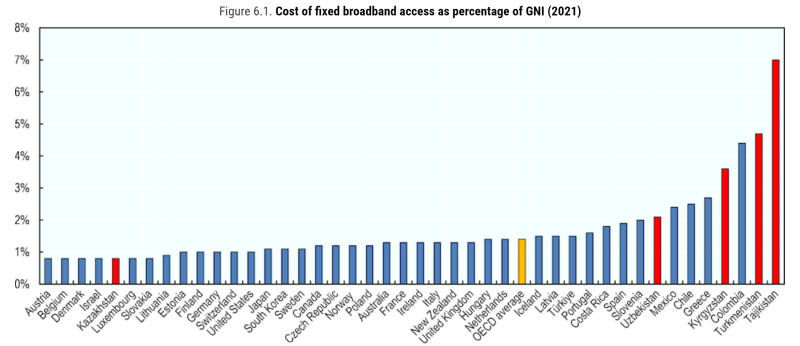
Figure 3: Cost of Fixed Broadband access as Percentage of GNI (2021)
The Index of Regulatory Restrictions on Foreign Direct Investment (FDI) from the OECD report indicates Uzbekistan’s openness to investments. According to this indicator, Uzbekistan ranks at a moderate level within the OECD and surpasses other countries in the region: Kazakhstan, Kyrgyzstan, and Mongolia.
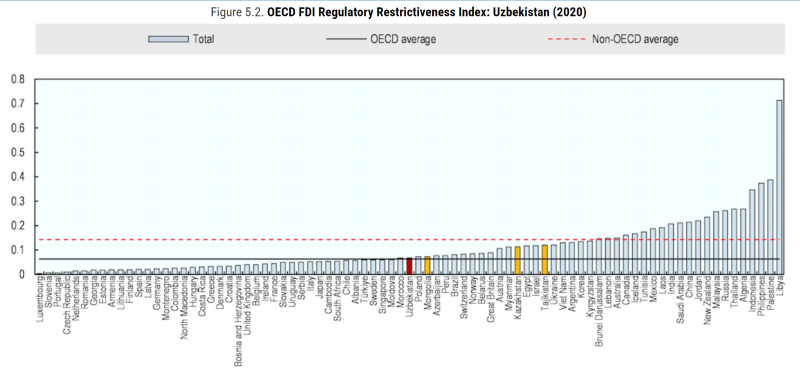
Figure 4: OECD FDI Regulatory Restrictiveness Index: Uzbekistan (2020)
Safe Uzbekistan
In addition to business opportunities, the conditions for staying in the country are of considerable importance. According to a study by the global leader in health and security services, International SOS, Uzbekistan is recognized as the safest country in Central Asia for foreigners.
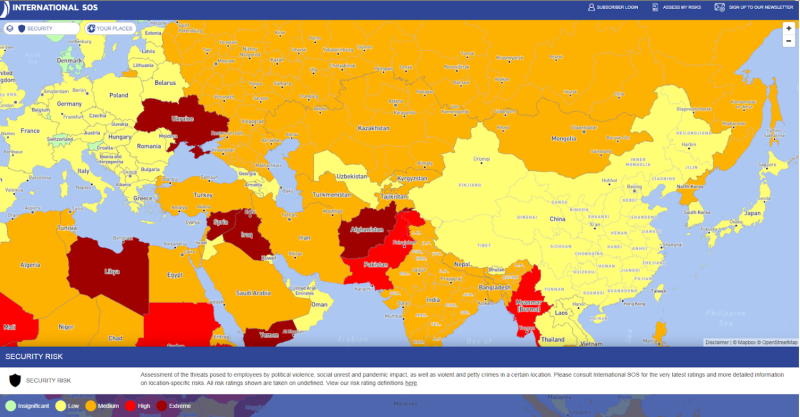
Figure 5: Uzbekistan — Safest Country in Central Asia
Classification of Uzbekistan as a low-risk country signifies minimal presence of violence, infrequent instances of mass disturbances and terrorism, effective security and emergency services, as well as well-developed infrastructure.
Conclusion
The combination of assessments and ratings from international organizations regarding the business climate in Uzbekistan creates a reliable image of the country for entrepreneurs and investors. The analysis of risks and opportunities by the Organization of Islamic Cooperation underscores the resilience of Uzbekistan’s economy and its attractiveness for foreign direct investment.
Reports from international organizations positively assess the outcomes of reforms conducted in the country, noting the simplification of tax legislation, reduction of barriers in cross-border trade, and the protection of investors and shareholders. The high level of digitization in the economy is also highlighted, significantly easing the launch and operation of businesses.
Information about the author:
Otabek Arzykulov — systems analyst, author of analytical articles for the publication “Economic Review”, and scientific articles on the digital economy, developed technologies and methodologies for Gazpromneft (Russia).
2024-01-22